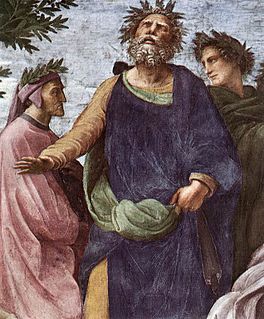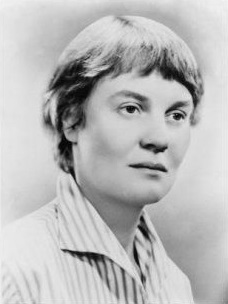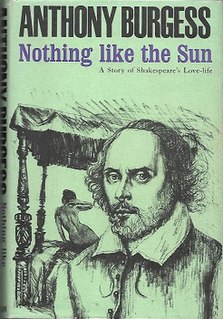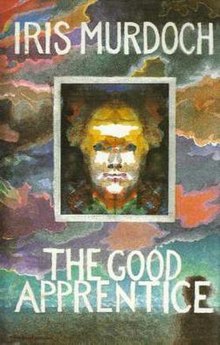
The Western canon is the body of high culture literature, music, philosophy, and works of art that is highly valued in the West: works that have achieved the status of classics. However, not all these works originate in the Western world, and such works are also valued throughout the world. It is "a certain Western intellectual tradition that goes from, say, Socrates to Wittgenstein in philosophy, and from Homer to James Joyce in literature".

Dame Jean Iris Murdoch was an Irish and British novelist and philosopher. Murdoch is best known for her novels about good and evil, sexual relationships, morality, and the power of the unconscious. Her first published novel, Under the Net (1954), was selected in 1998 as one of Modern Library's 100 best English-language novels of the 20th century. Her 1978 novel The Sea, the Sea won the Booker Prize. In 1987, she was made a Dame by Queen Elizabeth II for services to literature. In 2008, The Times ranked Murdoch twelfth on a list of "The 50 greatest British writers since 1945".

Sons and Lovers is a 1913 novel by the English writer D. H. Lawrence. It traces emotional conflicts through the protagonist, Paul Morel, and his suffocating relationships with a demanding mother and two very different lovers, which exert complex influences on the development of his manhood. The novel was originally published by Gerald Duckworth and Company Ltd., London, and Mitchell Kennerley Publishers, New York. While the novel initially received a lukewarm critical reception, along with allegations of obscenity, it is today regarded as a masterpiece by many critics and is often regarded as Lawrence's finest achievement. It tells us more about Lawrence's life and his phases, as his first was when he lost his mother in 1910 to whom he was particularly attached. And it was from then that he met Frieda Richthofen, and around this time that he began conceiving his two other great novels, The Rainbow and Women In Love, which had more sexual emphasis and maturity.

Ironweed is a 1983 novel by William Kennedy. It received the 1984 Pulitzer Prize for Fiction and is the third book in Kennedy's Albany Cycle. It is included in the Western Canon of the critic Harold Bloom.

John Crowley is an American author of fantasy, science fiction and historical fiction. He has also written essays. Crowley studied at Indiana University and has a second career as a documentary film writer.

As I Lay Dying is a 1930 Southern Gothic novel by American author William Faulkner. Faulkner's fifth novel, it is consistently ranked among the best novels of 20th-century literature. The title derives from Book XI of Homer's Odyssey, wherein Agamemnon tells Odysseus, "As I lay dying, the woman with the dog's eyes would not close my eyes as I descended into Hades."

The Sun Also Rises is a 1926 novel by American writer Ernest Hemingway, his first, that portrays American and British expatriates who travel from Paris to the Festival of San Fermín in Pamplona to watch the running of the bulls and the bullfights. An early modernist novel, it received mixed reviews upon publication. Hemingway biographer Jeffrey Meyers writes that it is now "recognized as Hemingway's greatest work" and Hemingway scholar Linda Wagner-Martin calls it his most important novel. The novel was published in the United States in October 1926 by Scribner's. A year later, Jonathan Cape published the novel in London under the title Fiesta. It remains in print.

The Rainbow is a novel by British author D. H. Lawrence, first published by Methuen & Co. in 1915. It follows three generations of the Brangwen family living in Nottinghamshire, focusing particularly on the individual's struggle to growth and fulfilment within the confining strictures of English social life. Lawrence's 1920 novel Women in Love is a sequel to The Rainbow.

The Hollow is a work of detective fiction by British writer Agatha Christie, first published in the United States by Dodd, Mead & Co. in 1946 and in the United Kingdom by the Collins Crime Club in November of the same year. The US edition retailed at $2.50 and the UK edition at eight shillings and sixpence (8/6). A paperback edition in the US by Dell Books in 1954 changed the title to Murder after Hours.

The Ghost Writer is a 1979 novel by the American author Philip Roth. It is the first of Roth's novels narrated by Nathan Zuckerman, one of the author's putative fictional alter egos, and constitutes the first book in his Zuckerman Bound trilogy. The novel touches on themes common to many Roth works, including identity, the responsibilities of authors to their subjects, and the condition of Jews in America. Parts of the novel are a reprise of The Diary of Anne Frank.

Nothing Like the Sun is a fictional biography of William Shakespeare by Anthony Burgess first published in 1964. It tells the story of Shakespeare's life with a mixture of fact and fiction, the latter including an affair with a black prostitute named Fatimah, who inspires the Dark Lady of the Sonnets. The title refers to the first line of Sonnet 130, "My mistress' eyes are nothing like the sun", in which Shakespeare describes his love for a dark-haired woman.

The Book of Ebenezer Le Page is a novel by Gerald Basil Edwards first published in the United Kingdom by Hamish Hamilton in 1981, and in the United States by Alfred A. Knopf in the same year. It has since been published by Penguin books and New York Review Books in their classics series, as well as in French and Italian.
Gerald Basil Edwards was a British author.

Ancient Evenings is a 1983 historical novel by American author Norman Mailer. Set in ancient Egypt and dealing with the lives of the characters Menenhetet One and Meni, the novel received mixed reviews. Reviewers noted the historical research that went into writing it and considered Mailer successful at conveying the nature of ancient Egyptian life. However, they also criticized the novel's narration and questioned its literary merit. Ancient Evenings has been compared to the work of the poet James Merrill and the novelist Thomas Pynchon, as well as to Mailer's novel Harlot's Ghost (1991). Some have suggested that its opening passage is its strongest part. Ancient Evenings served as an inspiration for the artist Matthew Barney's operatic film River of Fundament (2014).

Love & Sleep is a 1994 fantasy novel by John Crowley. It is the second novel in Crowley's Ægypt Sequence and a sequel to Crowley's 1987 novel The Solitudes. In it, the protagonist Pierce Moffett continues his book project begun in The Solitudes, exploring especially the relevance of systems of thought, even those magical and supposedly obsolete in writing a non-fiction book about the Renaissance and Hermeticism.

Bruno's Dream is a novel by Iris Murdoch. Published in 1969, it was her twelfth novel.

Harold Bloom was an American literary critic and the Sterling Professor of Humanities at Yale University. In 2017, Bloom was described as "probably the most famous literary critic in the English-speaking world." Following the publication of his first book in 1959, Bloom wrote more than 50 books, including over 40 books of literary criticism, several books discussing religion, and a novel. During his lifetime, he edited hundreds of anthologies concerning numerous literary and philosophical figures for the Chelsea House publishing firm. Bloom's books have been translated into more than 40 languages. Bloom was elected to the American Philosophical Society in 1995.

The Western Canon: The Books and School of the Ages is a 1994 book about Western literature by the American literary critic Harold Bloom, in which the author defends the concept of the Western canon by discussing 26 writers whom he sees as central to the canon.

The Solitudes is a 1987 fantasy novel by John Crowley. It is Crowley's fifth published novel and the first novel in the Ægypt tetralogy. Titled after Luis de Góngora's Las Soledades, the novel follows Pierce Moffett, a college history professor in his retreat from ordinary, academic life to pastoral life of Faraway Hills. While in the area, Pierce comes up with a plan to write a book about Hermeticism, in the process finding several parallels with his own project and that of the nearly-forgotten local novelist Fellowes Kraft.

Shuggie Bain is the debut novel by Scottish-American writer Douglas Stuart, published in 2020. It tells the story of the youngest of three children, Shuggie, growing up with his alcoholic mother Agnes in 1980s post-industrial working-class Glasgow.



















